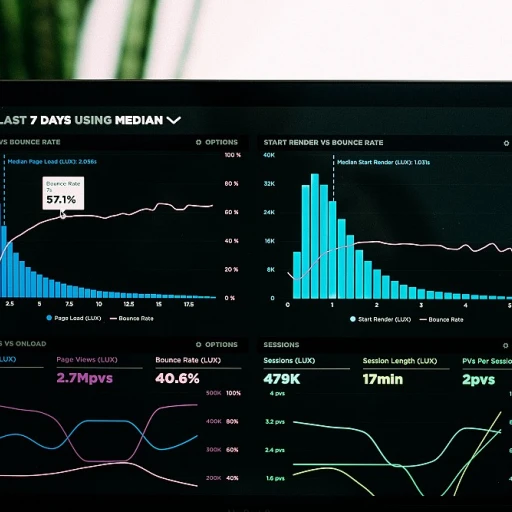
Unlocking the Potential of AI in SEO Content Analysis
Revolutionizing SEO Through AI-Powered Content Analysis
The advent of Artificial Intelligence (AI) has transformed numerous industries, and SEO is no exception. Today, AI in SEO represents a paradigm shift, making it possible to analyze large sets of data swiftly and efficiently. This revolutionary tool aids in understanding nuanced search engine algorithms and user behaviors, thereby optimizing content strategy to a level that was previously unattainable.
Traditional SEO strategies have primarily focused on keyword density and meta tags, but with the integration of AI, SEO content analysis has become more sophisticated. By employing machine learning and natural language processing, AI tools can delve deeper into content performance metrics, uncovering patterns that inform more effective SEO strategies.
Statistical insights, extracted using AI, empower SEO experts to pinpoint which content captures engagement and drives traffic. For instance, a study reveals that AI can enhance content visibility by 50% when utilized effectively in SEO (Source: Forbes). These insights are not only about what’s trending but also about what’s missing in existing content landscapes, granting the ability to craft exceedingly relevant and competitive content.
Elevating Content Quality with Semantic Analysis
AI-based semantic analysis is redefining keyword relevance. It involves understanding topics and their associated keywords in the context of search queries. This advancement in SEO content strategy stretches beyond mere keyword stuffing. Instead, it allows for the creation of content that aligns with user expectations and search engine preferences, both of which are crucial for a robust SEO ranking.
Through semantic analysis, AI systems interpret the searcher’s intent and provide recommendations for content that addresses those needs. This strategic alignment vastly improves the user’s experience by delivering content that is not only keyword-rich but also meaningful and useful.
Customized Content Strategies Backed by Predictive Analytics
AI doesn’t just analyze past and current data; it also forecasts future trends. Predictive analytics is an AI function that evaluates historical data and predicts what type of content will perform well in the future. SEO experts equipped with predictive analytics can stay ahead of the curve, producing content that is primed for success before a trend becomes oversaturated.
Equipped with the power of AI, your SEO strategy transforms into a data-driven powerhouse. You are no longer guessing what content will resonate with your audience; you are making informed decisions based on predictive trends and analysis. It’s a strategic evolution that could mean the difference between a good SEO strategy and a great one.
In our exploration of AI-driven SEO techniques, we will discuss how to transcend basic keyword optimization and harness the breadth of AI capabilities for crafting content that caters directly to user intent, personalizes user experience, and employs advanced analytics for measuring success. Deep diving into SEO analytics tools, content personalization, and user engagement are essential for mastering the orchestration of a highly successful SEO symphony. Stay tuned as we delve deeper into each of these pivotal aspects in the subsequent sections.
The AI-Enhanced Keyword Strategy: Beyond Simple Search Terms
Enhancing Keyword Intelligence with AI Integration
As the digital landscape becomes increasingly competitive, the role of keywords in SEO has evolved from mere 'search terms' to complex indicators of user behavior and intent. Integrating Artificial Intelligence (AI) into your SEO keyword strategy takes you beyond the rudimentary practice of keyword stuffing, into a more sophisticated realm of semantic search optimization and predictive analytics. Here's how AI changes the game for SEO professionals.
Decoding Semantic Search with AI
The inception of semantic search technology signified a paradigm shift in how search engines interpret queries. AI-powered tools understand the nuanced context of content, thanks to Natural Language Processing (NLP). This means the focus is no longer on individual keywords but rather on the underlying topics and user intent. AI-driven semantic analysis substantially enhances content relevancy, aligning with how modern search algorithms rank pages.
AI and the Evolution of Keyword Intent
Understanding the intent behind searches is critical for content that meets user needs. AI goes above and beyond traditional analysis by dissecting the layers of search intent — informational, navigational, transactional, or commercial investigation queries. By leveraging AI-driven content orchestration, writers can tailor content that not only ranks well but also speaks directly to where the user is in the buying journey.
Strategic Keyword Clustering Through Machine Learning
With the aid of machine learning algorithms, SEO specialists can now group keywords into clusters based on thematic relevance, search volume, and competition difficulty. This method promotes a holistic approach to content creation. Instead of targeting single keywords, content creators can address an entire topic cluster, significantly increasing the chances of ranking for a broad spectrum of related terms.
Predictive Keyword Analysis for Trend Forecasting
Forecasting future trends is an essential aspect of staying ahead in SEO. AI provides predictive insights by analyzing big data sets and market trends to suggest keywords likely to gain traction. Armed with this information, content strategists can be proactive rather than reactive in their content planning, ensuring they remain a step ahead of industry curves and market shifts.
Competitive Analysis and Gap Identification
Finally, AI facilitates a deep dive into competitor keyword strategies. It helps identify gaps in the market where your content can fill a void or outperform the competition. Through a comprehensive competitive analysis, AI tools not only suggest fresh keywords but also offer strategic insights on how to optimize existing content for better performance.
By exploiting the full capabilities of AI, SEO campaigns can transcend traditional practices. In a world where being specific, personal, and analytical is essential for online success, AI-powered keyword strategies are reshaping the industry. Remember, the ultimate goal is crafting content that resonates with your audience at every step of their online journey — a challenge well met with the support of advanced AI technologies.
User Intent Profiling with AI: Crafting Content That Resonates
The Art of Understanding User Intent
Delving into the intricate world of content creation, one must not only be a craftsman but also a keen psychologist. Understanding user intent has emerged as a cornerstone of effective SEO strategies, and Artificial Intelligence (AI) is the magnifying glass that brings the fuzzy outlines of user desires into sharp relief. It's no longer just about what your audience is searching for, but why they're seeking it out.
To truly resonate with your audience and boost your search engine rankings, content must align with the various types of user intents - informational, navigational, transactional, or commercial investigation. These intents highlight the need for a shift from keyword stuffing to creating meaningful content that satisfies the user's quest for information.
Deciphering Search Context with AI
In recognizing user needs, AI tools have become invaluable. They analyze vast arrays of data points, from search term patterns to user behavior on your website, offering insights into the context behind searches. These insights empower content creators to tailor their messages, honing in on the specific needs and preferences of their audience. By meticulously crafting content that aligns with user intent, one not only increases organic traffic but also fosters genuine engagement.
For a deeper dive into the significant impact of AI on shaping content around user intent, please explore how AI-driven content orchestration can perfect your SEO symphony.
Case Studies and Real-World Examples
Let's take the example of an online retailer who sells outdoor apparel. By analyzing search queries and on-site interactions using AI, they discovered a segment of their visitors who were not just looking for winter jackets but were specifically preparing for high-altitude hiking. This realization led to the creation of a series of detailed guides on choosing the right gear for extreme weather conditions, establishing the retailer as a trusted resource and authority in the niche.
Statistical analysis reveals that by focusing on user intent, businesses can witness a significant boost in key performance indicators. Websites that align their content with user intent are shown to have up to a 5-times higher chance of converting visitors into customers, according to recent studies.
Understanding user intent through AI doesn’t just attract visitors; it builds the kind of reputation and trust that turns a one-time visitor into a loyal follower. With the right tools and a detailed understanding of your audience, the potential for crafting resonant content that leads to tangible SEO success is vast.
AI-Driven Content Personalization: The Key to User Engagement
AI-Driven Content Personalization: The Key to User Engagement
The digital landscape is evolving, and with it, the parameters for effective search engine optimization (SEO). Personalization is not just a buzzword; it's a cornerstone of user engagement and retention. By incorporating artificial intelligence (AI) into your SEO strategy, personalization can be taken to a level where each piece of content speaks directly to the individual consumer's needs and interests.
Tailoring Content to The Individual's Journey
- Understanding the consumer lifecycle is central to producing content that engages. AI tools analyze user data, creating profiles that predict future behaviour and inform content strategy.
- AI algorithms can segment audiences based on various factors such as demographics, browsing history, and interaction patterns, ensuring a targeted approach.
Dynamic Content Adaptation with AI
AI's capability to adapt content in real-time is revolutionary. Imagine delivering a user experience that morphs based on real-time engagement. Content can dynamically change its structure, tone, or even call-to-action based on user behaviour, providing a tailored experience that boosts SEO ranking due to improved user engagement metrics.
Incorporating Predictive Analytics for Content Precision
Predictive analytics, empowered by AI, can forecast the likelihood of a user's future actions. This data enables content creators to craft messages that resonate on a deeper level because they are designed with the user's next move in mind.
- By analysing past user interactions, AI can predict what topics or products a user might be interested in next.
- This approach not only drives engagement but can significantly increase the probability of conversion, making your content work smarter for your SEO goals.
As we've seen in earlier discussions, the integration of AI into SEO practices enriches keyword strategies and content analysis. Therefore, when it comes to personalization, we're looking at an SEO landscape where AI is not just an additive tool, but a transformative one. It enables content creators to forge a deeper connection with their audience by delivering relevant, personalized content at every touchpoint.
Measuring Success: AI Tools for Advanced SEO Analytics
Harnessing AI for In-Depth SEO Performance Insights
In today's digital age, search engine optimization (SEO) is an intricate part of content creation that requires not only creativity but also a strategic approach powered by data analysis. Artificial Intelligence (AI) offers unprecedented opportunities to measure the effectiveness of SEO tactics, parse through complex data sets, and derive actionable insights. Advanced AI analytics tools enable marketers and content creators to understand precisely which part of their strategy is working and what needs improvement.
Intelligent SEO Analytics: Beyond the Basics
While traditional analytics provide surface-level information such as page views or bounce rates, AI-powered SEO tools delve much deeper. They can effectively track user engagement, identify patterns in user behavior, and even predict future trends. This granular data can be a gold mine for those looking to refine their content and outperform competition in search results. Features such as sentiment analysis and image recognition add layers of understanding that transcend basic keyword performance metrics.
Optimizing SEO with Predictive Analytics
The real power of AI in SEO lies in its predictive capabilities. By analyzing past performance data and current market trends, AI algorithms can forecast the potential success of different content strategies. This predictive capacity equips content creators with the foresight to make informed decisions, focus on high-opportunity areas, and allocate resources more efficiently, ultimately leading to a higher ROI for SEO efforts.
Seamlessly Integrating AI Tools into Your SEO Workflow
One challenge that many face is seamlessly integrating AI tools into their existing SEO workflows. The beauty of today’s AI applications is their user-friendly interfaces and the compatibility with popular SEO platforms. Many AI tools also offer comprehensive reporting features, which allow for the easy monitoring of multiple SEO metrics, making it simpler for decision-makers to draw conclusions and adjust strategies in real-time.
Achieving Long-Term SEO Success with AI-Driven Analytics
With the advent of AI in SEO, gone are the days of guesswork and assumptions. Data-driven strategies are now at the forefront of SEO success. By leveraging AI for advanced analytics, one can ensure that the efforts put into creating and optimizing content are not in vain. The dynamic insights provided by AI empower creators to draft content that not only ranks well but also provides valuable, engaging experiences for users—securing long-term success in the ever-evolving landscape of SEO.








